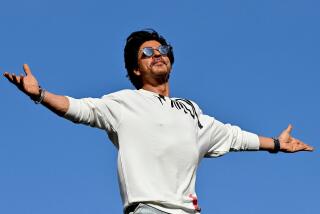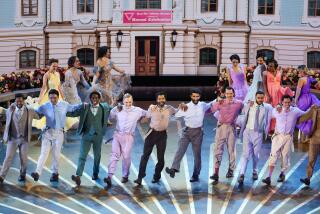India revels in ‘Slumdog Millionaire’s’ Oscar triumph
- Share via
NEW DELHI — Forget the global downturn, the wrangling with neighbors, the traffic jams.
Monday dawned in India with celebration as word spread that “Slumdog Millionaire” had snagged eight Academy Awards, including best picture and best director. “Slumdog is Top Dog!” read a television headline.
Many woke up before dawn to watch the results live given the time difference. And for most, it was more than worth it. This was India’s day, a time to beam with pride as the world’s largest democracy gathered up Oscar gold.
“I’m at work, but if I didn’t have to be here, I’d be on the street jumping up and down and shouting,” said Mohammed Asif, 26, an employee in a coffee bar in New Delhi. “In spite of the weaker economy, ‘Slumdog Millionaire’ gives us hope. Maybe each of us can go out and win a million dollars too.”
Downplayed, at least for a few minutes, was the debate over whether “Slumdog” was a real Indian film, whether it fairly depicted India, whether slums were the image the nation wanted to project. There was glory to be had and more than enough to go around.
“What a day it’s been for India!” gushed an announcer on one of the nation’s 24/7 hyperactive news channels.
“The winners have done India proud,” said Prime Minister Manmohan Singh.
In the Mumbai slums where the film was shot, children broke into impromptu Bollywood dancing and crowds cheered as neighbors huddled around TV sets.
Local television gave extensive coverage to two slum dwellers who acted in the film, Azharuddin Mohammed Ismail, 10, and Rubina Ali, 9, highlighting their own rags-to-riches journey as they flew to Hollywood for the awards ceremony.
In Chennai, the hometown of A.R. Rahman, who won Oscars for best original score and best original song, supporters handed out candy, set off fireworks and cut a huge cake positioned in the middle of the street near his home.
“Jai ho,” or “Praise be,” the chorus of the film’s hit song, could be heard on many Indian channels throughout the day.
“This is a great moment. After the Mumbai attack, everyone relates to Rahman as an Indian rather than a Muslim,” said P.M. Jagannathan, 56, a chemical engineer from Mumbai, which in November was the site of a days-long assault by Islamic militants. “He’s doing the job that politicians should be doing -- uniting people rather than dividing them.”
Not everyone was overjoyed by the recognition, however.
“This is all a big show,” said Nicholas Anthony, 47, who runs a video game parlor in Dharavi, the Mumbai slum where much of the movie was shot. “Just walk around Dharavi and spend a day with the kids here and you will understand that ‘Slumdog’ doesn’t represent Dharavi.”
Shiv Vishwanathan, an anthropologist based in the western city of Ahmedabad, said the film reflected neither India’s own view of itself nor the outside world’s view of India.
By successfully combining an English movie, American recognition, the local Indian view and the sensibility of India’s far-flung diaspora, however, the filmmakers managed to unite elements of the Indian mind-set in a unique way, he said.
“It’s a Hollywood version of a Bollywood myth that’s inverted and speeded up,” Vishwanathan said.
“All of my colleagues were the same -- we were all up early to watch,” he added. “Whether it’s a spelling bee or the Oscars, we’re desperate for recognition. This is good news, everyone wants it, and today we got it.”
--
--
Pavitra Ramaswamy in The Times’ New Delhi Bureau contributed to this report.
More to Read
Sign up for Essential California
The most important California stories and recommendations in your inbox every morning.
You may occasionally receive promotional content from the Los Angeles Times.










